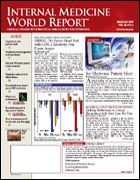Publication
Article
Successful Retroviral Therapy Doesn't Prevent HIV Transmission
Author(s):
From the Infectious Diseases Society of America
TORONTO, Canada—HIV-positive women who are treated successfully with highly active antiretroviral therapy (HAART) and are otherwise healthy and have no detectable virus in the blood plasma may still shed the virus in the genital tract, new data presented at the Infectious Diseases Society of America annual meeting show.
This is one of the few longitudinal studies to assess the pattern of genital tract HIV-1 RNA shedding among women taking HAART who have undetectable viral load. The study included 49 women; genital tract secretions were collected by Sno-Strip every 4 weeks; median CD4+ cell count was 412/mm3.
“It is very important for women to realize that even when they feel healthy and have no detectable HIV in the blood plasma, they still risk passing the disease to others and must practice safe sex at all times,” said lead investigator Susan Cu-Uvin, MD, of Brown Medical School, and director of the Immunology Center at Miriam Hospital, Providence, RI.
Among the 46 women who maintained a below-detectable plasma viral load, 8 (17%) had at least 1 instance of detectable HIV levels in the genital tract between negative tests and were classified as intermittent shedders.
Another 4 women (9%) had at least 2 consecutive episodes of HIV shedding in the genital tract and were classified as persistent shedders. A dozen women (26%) were classified as indeterminate shedders, because they had at least 1 episode in which HIV was detected in the genital tract, but their data were incomplete because of missed visits, failure to collect appropriate specimens, or inconclusive lab results. Tests detected no virus in 22 women (48%).
“Every doctor who takes care of an HIV-infected patient should always, continually address the issue of secondary prevention. That is the most important message to get out,” Dr Cu-Uvin told IMWR. “We need to do more to help stop transmission, and primary care physicians play a very important role,” she emphasized.






